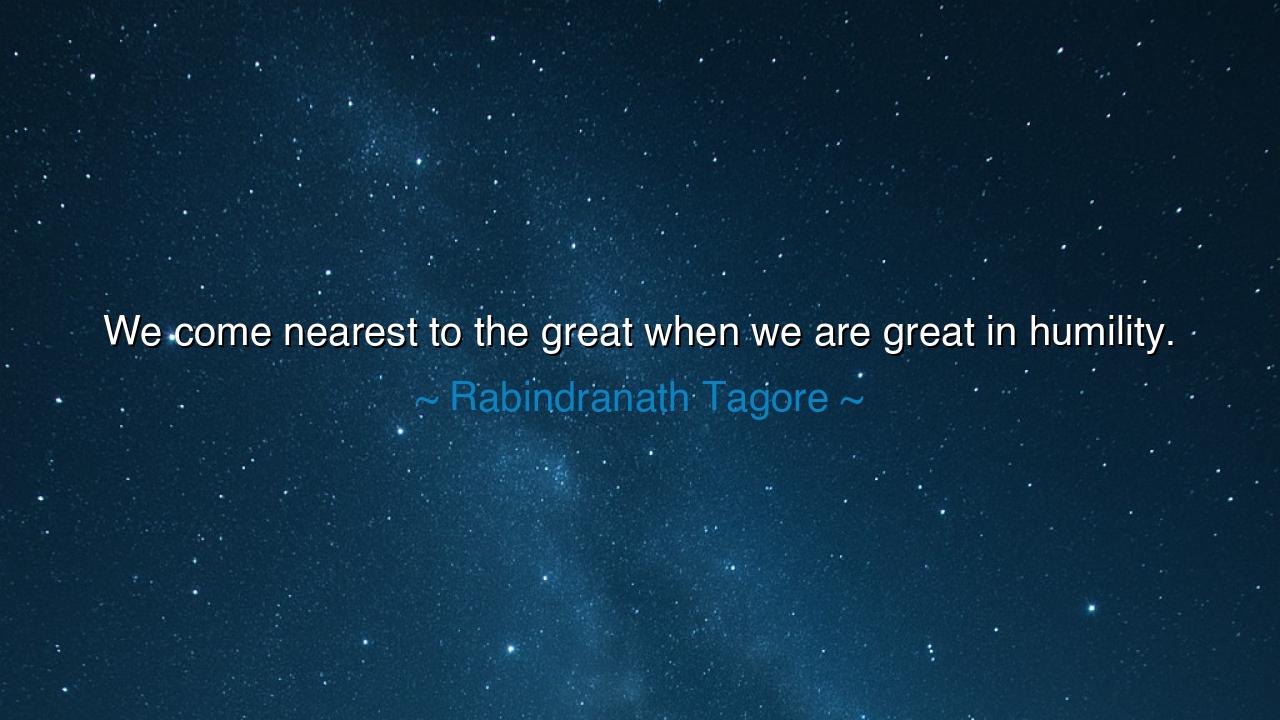
We come nearest to the great when we are great in humility.






In this timeless saying, Rabindranath Tagore — poet, sage, and son of the East — unveils a truth so profound that it binds both heaven and earth: “We come nearest to the great when we are great in humility.” These words speak not of weakness, but of a strength so radiant it bows without fear. To be humble is to stand before creation and know one’s place within it — not as the ruler of all things, but as the servant of truth, the vessel of grace. In the stillness of humility, man draws near to the divine, for only when the heart kneels can it behold the greatness that lifts it.
Humility, as Tagore understood, is not the shrouding of one’s light, but the recognition of its source. The proud man believes his brilliance comes from himself; the humble man knows it comes through himself. The proud speaks loudly of conquest, yet is consumed by the emptiness of his own echo; the humble works in silence, and the world is changed by his touch. In this paradox lies Tagore’s wisdom — that true greatness is not achieved through dominance, but through surrender. The mountain does not raise itself to boast; it rises quietly, clothed in clouds, unmoved by praise or scorn.
Consider the life of Mahatma Gandhi, a man small in frame yet vast in spirit. He owned no throne, commanded no army, and wore no crown of gold — only a simple garment of homespun cloth. Yet in his humility, he carried a power that no empire could crush. His greatness lay in the depth of his selflessness, his refusal to exalt himself even as the world bowed before him. When others sought glory through war, Gandhi sought victory through peace. In bending low, he stood taller than kings; in serving others, he became the measure of greatness itself. It is as if Tagore, his friend in spirit, had seen Gandhi’s soul before it walked the earth and written these words as prophecy.
The ancients, too, knew this secret. In the Upanishads it is said: “The knower of Brahman becomes Brahman.” But only the humble can know Brahman — for the proud heart is too full of itself to receive the infinite. So it was with Socrates, who claimed to know nothing, and through that confession, became the wisest of men. So it was with Lao Tzu, who taught that the highest good is like water — it nourishes all, yet seeks the lowest place. In every age, the truly great have walked softly, for they understood that humility is the gateway to eternity.
Pride is a fortress, and within it, the soul suffocates. But humility is a river — flowing, fresh, and free. When a man lays down his need to prove himself, he becomes open to the greatness of all things. The sun does not declare itself the center of the sky; it simply shines, and the world revolves in its light. Likewise, the humble heart shines without demand, and in doing so, draws near to the sacred. For what is greatness if not service? And what is service if not humility made visible?
The meaning of Tagore’s quote, then, reaches beyond mere conduct. It is a spiritual law: to become great, one must first become small. The seed must bury itself before the tree can rise. The artist must empty himself before inspiration can dwell within. The leader must kneel before his people before he can lift them up. This is not the humility of defeat, but of divine alignment — the recognition that we are instruments in the hands of something greater, and only by yielding can we be played in harmony.
The lesson for all who seek greatness is this: do not chase it. Greatness is not hunted; it is revealed to those who serve. Walk humbly with your gifts; bow to the wisdom that shaped you; honor both your strength and your limits. Speak softly, work earnestly, and love deeply — and in doing so, you will find that you have drawn close to the great, not because you have conquered, but because you have become part of something far beyond yourself.
Thus, remember the words of Tagore as a lamp for your journey: “We come nearest to the great when we are great in humility.” When you rise, let it be from the ground of reverence; when you speak, let your words carry gentleness; when you act, let your deeds be for others. For in the lowliness of spirit lies the highest wisdom, and in the bending of the knee, the soul touches heaven.






AAdministratorAdministrator
Welcome, honored guests. Please leave a comment, we will respond soon